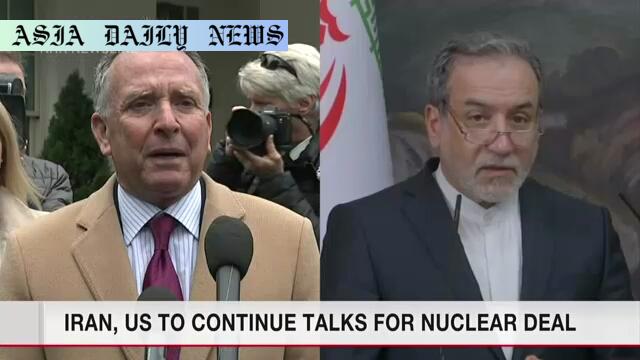Nuclear Talks: US and Iran agree to advance on key principles in nuclear negotiations, set for expert and high-level discussions next week.
US and Iran agreed to advance talks on Tehran’s nuclear program.
Indirect negotiations mediated by Oman’s foreign ministry.
Next round to include expert-level meetings and high-level talks.
Focus remains on limiting Iran’s nuclear development.

Introduction
The diplomatic landscape between the United States and Iran continues to evolve as both nations have agreed to advance their direct and indirect negotiations on Tehran’s nuclear program. Over the past few weeks, discussions have gained notable momentum, with both sides voicing cautious optimism about creating a framework for a potential agreement. This development comes amidst broader geopolitical tensions and long-standing concerns over the security ramifications of Iran’s nuclear ambitions.
Recent Developments and Achievements
Last weekend, US Special Envoy to the Middle East Steve Witkoff met with Iranian Foreign Minister Abbas Araghchi in Rome. This meeting followed a previous round of indirect discussions held in Oman, where both parties, mediated by Oman’s foreign minister, worked toward a better understanding of their positions. Though contentious issues remain on the table, both counterparts expressed optimism, with Iran’s foreign minister stating that they have “managed to attain better understanding on a number of principles and targets.” Importantly, these discussions remain centered on the United States’ goal to prevent Iran from developing nuclear weapons, while Iran maintains its nuclear program is for peaceful purposes and seeks the removal of US-imposed sanctions.
Looking Ahead: Expert Meetings and High-Level Talks
As part of the framework process, both sides are scheduled to hold expert-level meetings on Wednesday, followed by another round of high-level negotiations set for Saturday. These upcoming meetings aim to delve deeper into the technical details and contentious elements of the negotiations, particularly focusing on the scope of restrictions Washington seeks to impose on Tehran’s nuclear endeavors. Notably, Iran has reportedly insisted that the issue of a complete halt to its nuclear program will not be on the table.
Geopolitical Importance of the Talks
The stakes of these negotiations are high for both regional and global security. For the United States, limiting Iran’s nuclear ambitions is critical to ensuring stability in the Middle East and maintaining alliances with key players in the region, such as Israel and Saudi Arabia. For Iran, a successful agreement could pave the way for the easing or removal of crippling economic sanctions, which have significantly impacted the nation’s economy and everyday life. Hence, the outcomes of these discussions could mark a pivotal turning point in US-Iran relations and influence the future of nuclear non-proliferation efforts globally.
The Path Forward
The success of this renewed round of negotiations will ultimately depend on both sides’ willingness to compromise and find common ground. While the United States prioritizes limiting Iran’s ability to potentially develop nuclear weapons, Iran’s demands for sanction relief cannot be ignored. These points of contention will undoubtedly test the diplomatic prowess and political will of both nations in the days and weeks to come. However, the engagement of expert-level discussions ahead of the next high-level talks signals intent and progress, even if significant hurdles remain.
Conclusion
As the next stages of negotiations unfold, the global community will closely watch the progression of these critical talks. A successful resolution has the potential to alter the dynamics of not only US-Iran relations but also global power structures at large. Amidst the challenges, there remains a glimmer of hope that these discussions will advance toward a peaceful and constructive resolution.



Commentary
Significance of the Nuclear Talks
The recent advancements in nuclear negotiations between the United States and Iran mark a significant step in addressing one of the most pressing global security issues. These talks represent a delicate balancing act, where both sides must navigate a complex web of political, economic, and security interests. In particular, the willingness of both nations to engage in both expert and high-level discussions suggests a shared recognition of the importance of finding a workable solution to their long-standing differences. This openness to dialogue, despite substantial disagreements, provides a much-needed ray of hope in an otherwise turbulent international landscape.
The Role of Mediation and Third Parties
A notable aspect of these negotiations is the role played by Oman as a mediator. The inclusion of a neutral party has helped to foster a more constructive atmosphere, enabling indirect communication that might have otherwise been hindered by mutual distrust. Mediation not only facilitates dialogue but also serves as a bridge for translating intentions into practical commitments. Oman’s involvement underscores the importance of inclusive diplomacy, where smaller yet strategically situated nations can contribute meaningfully to resolving complex global challenges.
Challenges and Opportunities Ahead
While progress has been made, these negotiations remain fraught with challenges. The United States’ demand to limit Iran’s nuclear capabilities directly conflicts with Tehran’s aspirations for sovereignty over its domestic programs. Moreover, Iran’s insistence on the removal of sanctions introduces another layer of complexity. However, these challenges also present opportunities. If compromises can be reached, they could not only address immediate concerns over nuclear proliferation but also lay the groundwork for improved US-Iran relations. Furthermore, a successful resolution could have a ripple effect, alleviating tensions in the Middle East and fostering greater international cooperation.
Final Thoughts
As these negotiations progress, it is imperative for both nations to act with foresight and flexibility. The decisions made in the coming weeks will have lasting implications not just for US-Iran relations, but for the broader international community. Through sustained dialogue, mutual respect, and a commitment to peace, there remains a genuine possibility of achieving a breakthrough that benefits all parties involved.